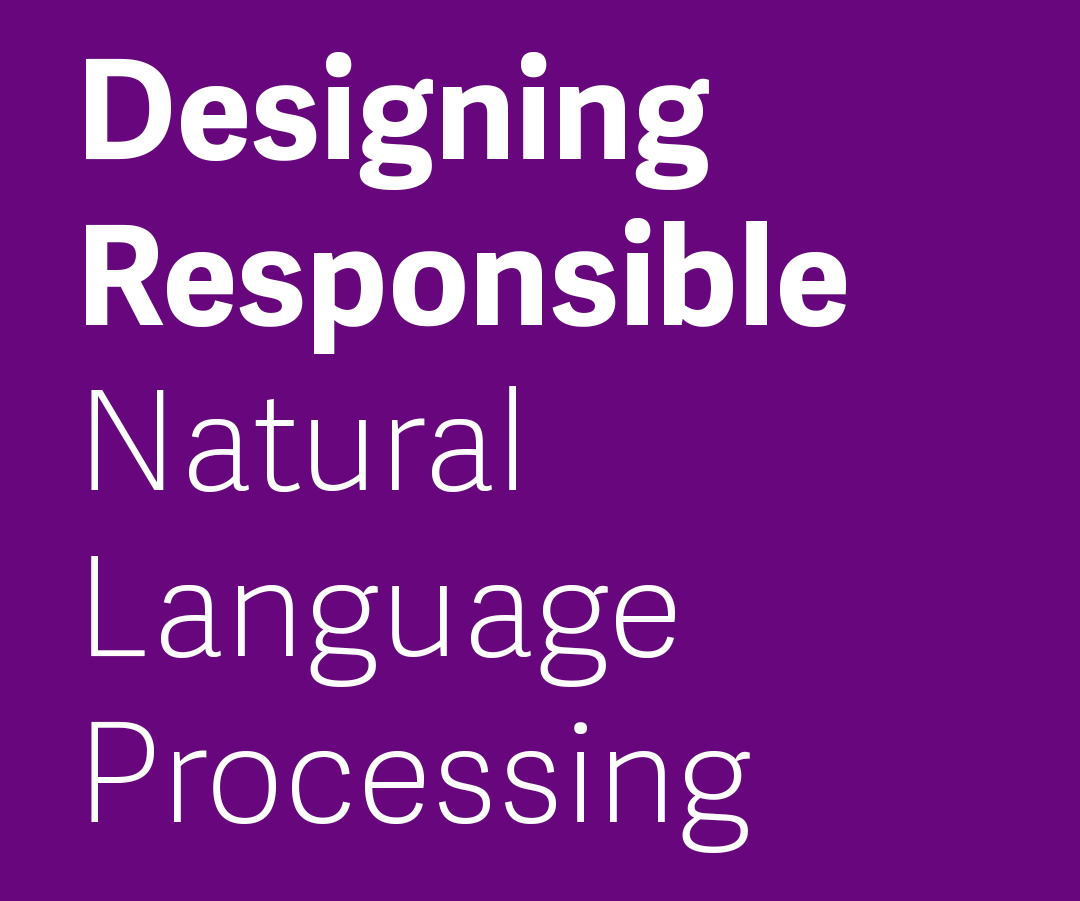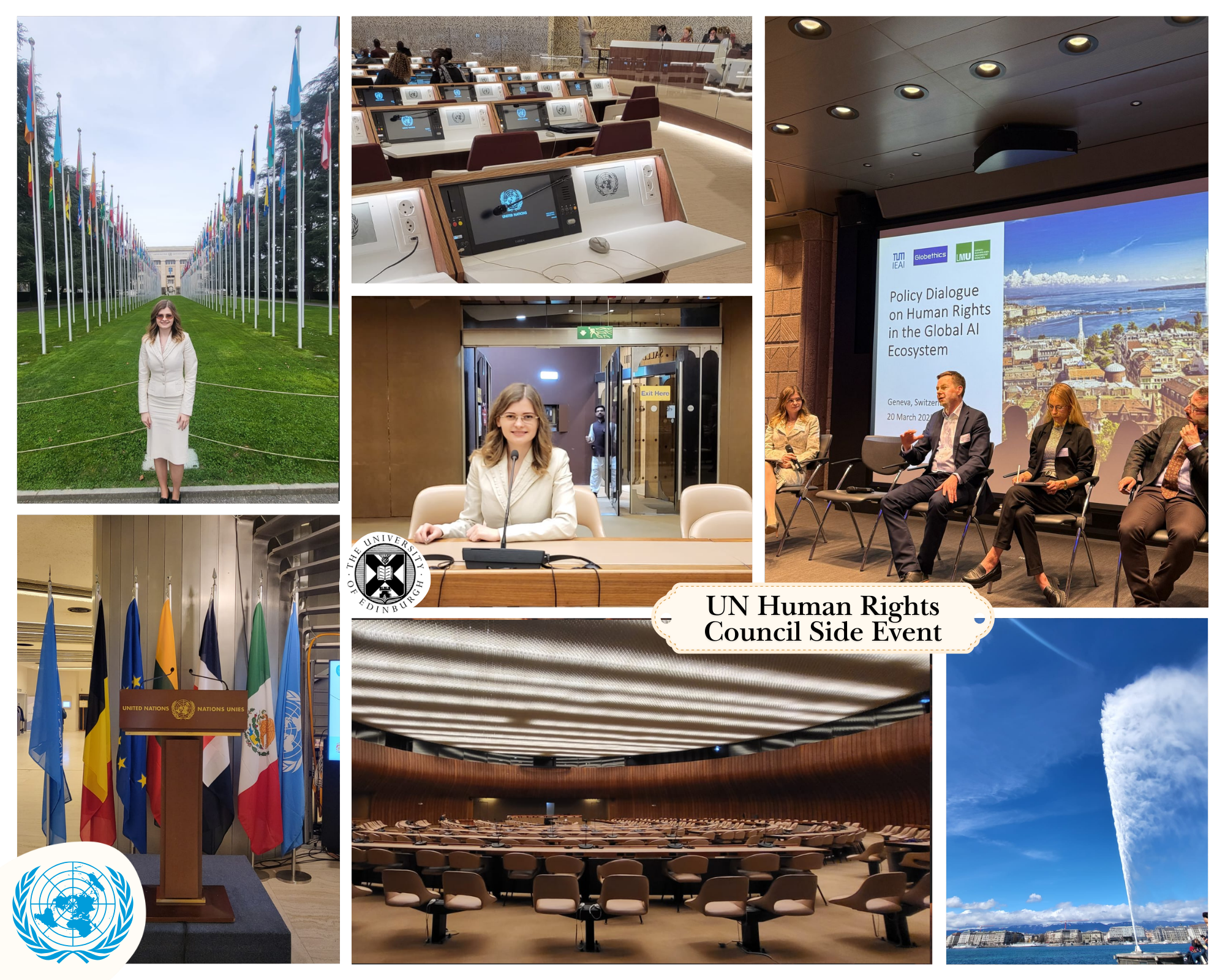We will be highlighting some of the work and activities of our CDT students in the coming months on this blog feed. In the second of our blog posts, Amanda Horzyk shares her experiences of participating in ethics and AI policy forums over her first 6 months of study.
In September 2024, I had the pleasure to participate in Global Ethics Forum, 20th Anniversary. Having the opportunity to meet great researchers, policy advocates, ethicists and industry and academic leaders, I connected deeply with the values Globethics nurtured. As an international non-governmental organisation, in consultative status with the UN ECOSOC, it is dedicated to advancing ethical leadership worldwide. Strategically positioned in engaging with global decision makers, multilateral organisations and policy discussions they shape ethical standards worldwide.
What most appealed to me about this great team, grounded in regional and contextual realities working across Africa, Asia, Latin-America and Europe is their dedication to translational ethics, policy convening, thought-leadership and knowledge-exchange endeavours and youth empowerment. Globethics is an organisation dedicated to bridging the gap between global ethics frameworks and local implementation through the empowerment of institutions and individuals towards excellence in responsible governance. I had the immense pleasure and honour to be invited by them to contribute to their numerous efforts in advancing Responsible AI policy – one of their five focus areas.
Since I started my PhD programme in September, and following research in Making International Law during my master’s degree in Innovation Technology Law and I received further training in AI Policy with the Centre for Digital and AI Policy (graduated policy clinic with distinction!). I had the opportunity to grow in the necessary understanding, context of how legal and policy frameworks in the global landscape emerge and develop – shaping the narrative of Global and local AI governance and regulation. As a research group member, I had the opportunity to contribute to the upcoming AI and Democratic Values Index 2025 Edition (to be published 3rd April here) alongside dozens of other research members to evaluate the efforts countries undertake to adopt, implement and operationalise ethical principles and policy aspirations in the protection of Human Rights and Democratic Values across 80+ countries.
Given my background in AI law and policy, as well as interdisciplinary research and pioneering efforts with AI researchers in bridging technical and legal understandings, I was invited as a panellist at the Geneva Peace Week forum 2024, contributing to the necessary discussion on AI’s Political Potential (see here). Subsequently, in October 2024 I was invited to publish a chapter in AI governance ethics: artificial intelligence with shared values and rules with Globethics Publications, on Challenging Obligations: Investigating the ‘AI Literacy’ Mandate for Human Oversight, (access here).
During this year’s 20-21st March event I was able to reconnect with great researchers at Ludwig Maximilian University and the Globethics team, who began an exciting journey of efforts in Human Rights and Artificial Intelligence that started in Munich at the Technology University Munich (TUM) – Institute for Ethics in Artificial Intelligence, with around 50 experts working on a new Draft Convention on AI, Data and Human Rights at the International AI and Human Rights Summit (July 16, 2024). I had the opportunity to contribute to the subsequent white paper behind this work that addresses key concerns posed by AI.
The Draft Convention recognizes AI’s broader impact on Human Rights, beyond algorithmic harm including, available (here):
- Labour rights within the AI value chain
- Societal shifts driven by AI and data usage
- Cross-border effects of AI, accounting for political, economic and cultural disparities
- Socio-economic sand political disruptions, such as monopolies emerging from AI
- The misuse of AI in ways that threaten human rights and international law.
It also establishes International Mechanisms to Address AI-Related Human Rights Risks, focusing on:
- Definitions of AI systems, AI lifecycle and data governance
- Prohibited AI use cases
- Sectors critical to human rights
- Corporate responsibilities across the AI value chain
The white paper is available here: (link).Apart from reviewing the White Paper, I co-authored an important section positioning the current Convention Efforts in the Global AI Policy Landscape, examining the International and Humanitarian Law developments as well as analysed a comprehensive view on the emerging AI international legal and policy landscape. Importantly, our work concluded with a call:
An Action Agenda for Human Rights in the Age of AI
For the UN Human Rights Council to prioritise:
- Promotion of the use of AI to identify and provide evidence for abuses of human rights by member states
- Prohibition of AI practices that violate international human rights law.
- Identification of high-risk areas requiring heightened scrutiny and protection
- Discussion on the intersection of human rights with other domains of international law in the context of AI.
- Definition of algorithmic rights and relatedly neurorights in the context of AI and mechanisms for their realization globally.
The White Paper:
While recognising the significant advancements in AI leading to widely available, cost-effective solutions; the promotion and accessibility of knowledge, advancement in research and innovation permeating almost every sector of our economies and societies we recognise AI as a powerful tool in business contexts, offering decision support analytics and mechanisms for collective decision-making and affairs. “AI [can be] a driver of Societal Change”, but it is important what change we are working towards.
The efforts in the course of this work, seek to address the Legal Lacunae in International Approaches to AI Governance.
- Eurocentric Dominance in AI Governance – Existing frameworks are heavily influenced by the AI Act highlighting the need for stronger representation from the Global Majority (e.g. Indigenous Rights, LatAm, the African Union, Asia-Pacific)
- Absence of International AI Frameworks – No comprehensive framework to address AI’s cross-border impact, leading to inconsistencies and fragmentation in governance.
- Corporate Accountability Gaps – Multinational corporations often operate without clear accountability nor transparency mechanisms for AI-induced harms.
- Narrow Understanding of Human Rights Impacts – AI-related human rights concerns are often perceived at the individual level – overlooking broader collective, societal, systemic and environmental effects.
Towards the launch event for the revised Convention and Whitepaper; I was invited to moderate a panel discussion on Humanitarian Law, International Law, and AI. My panel was a part of the UN Human Rights Council Side Event, looking at Human Rights in the Global AI Ecosystem in Geneva.
The closed-door discussion was opened to the experts contributing to the White Paper and the Convention efforts, UN representatives, Foreign State Ministry delegates, Globethics and the partnering institutions of TUM and LMU. The 2-day event consisted of brilliant policy discussions on the first day; followed by the presentation and representation of the Convention Efforts at the UN Human-Rights Council’s 58th Side Session at Palais de Nations.
It was an incredible opportunity to open the day, as the moderator of the first panel on Humanitarian Law, International Law and AI: Discussing the intersection of AI, humanitarian law, and indigenous rights; addressing AI’s impact on humanitarian operations and crisis response.
It was inspiring to listen to and connect with other experts and discussions covering the:
- AI impact on Democracy, Political and Civil Rights: challenges and opportunities (Discussing the impact of AI on democracy and political and civil rights, and how the political institutions and international organizations are responding to this novel situation)
- AI in Business, Standardization, and Human Rights (Discussing the importance of AI standardization in ethical compliance and risk mitigation; challenges in creating globally recognized AI governance models; Corporate responsibility, liability, and enforcement mechanisms)
- Inclusive and Human-Centered Approach to AI as a Global Common Good (Discussion on how to ensure underrepresented voices are included in AI governance; to mitigate the impact on marginalized groups; to address AI bias, structural inequalities, and power imbalance, ensuring that AI is a global common good)
It was truly an amazing experience to bring my own expertise into this community with representatives from Foreign Ministries, Civil Society, Foundations, Humanitarian Operations: The Centre for AI and Digital Policy, AI Commons, the Kofi Annan Foundation, GICHD Industry (SAP, Tech Ethics), UN’s ITU, and Academia Geneva Academy and Stefan Wyszynski University, LMU and TMU.
When moderating the discussion, I sought to:
- Explore questions around the current direction of international policy landscape and the need for an international governance response to AI its potential and peril;
- Look at what is missing from the dialogue in AI & international law perspectives – by examining hands-on examples of opportunities and negative impacts of AI on humanitarian action, and human right’s law;
- and draw conclusions on the effective action we can undertake with our international counterparts to facilitate objectives of humanitarian law, human rights and operations.
Watch out here, for the event report that will be soon published and circulated!

